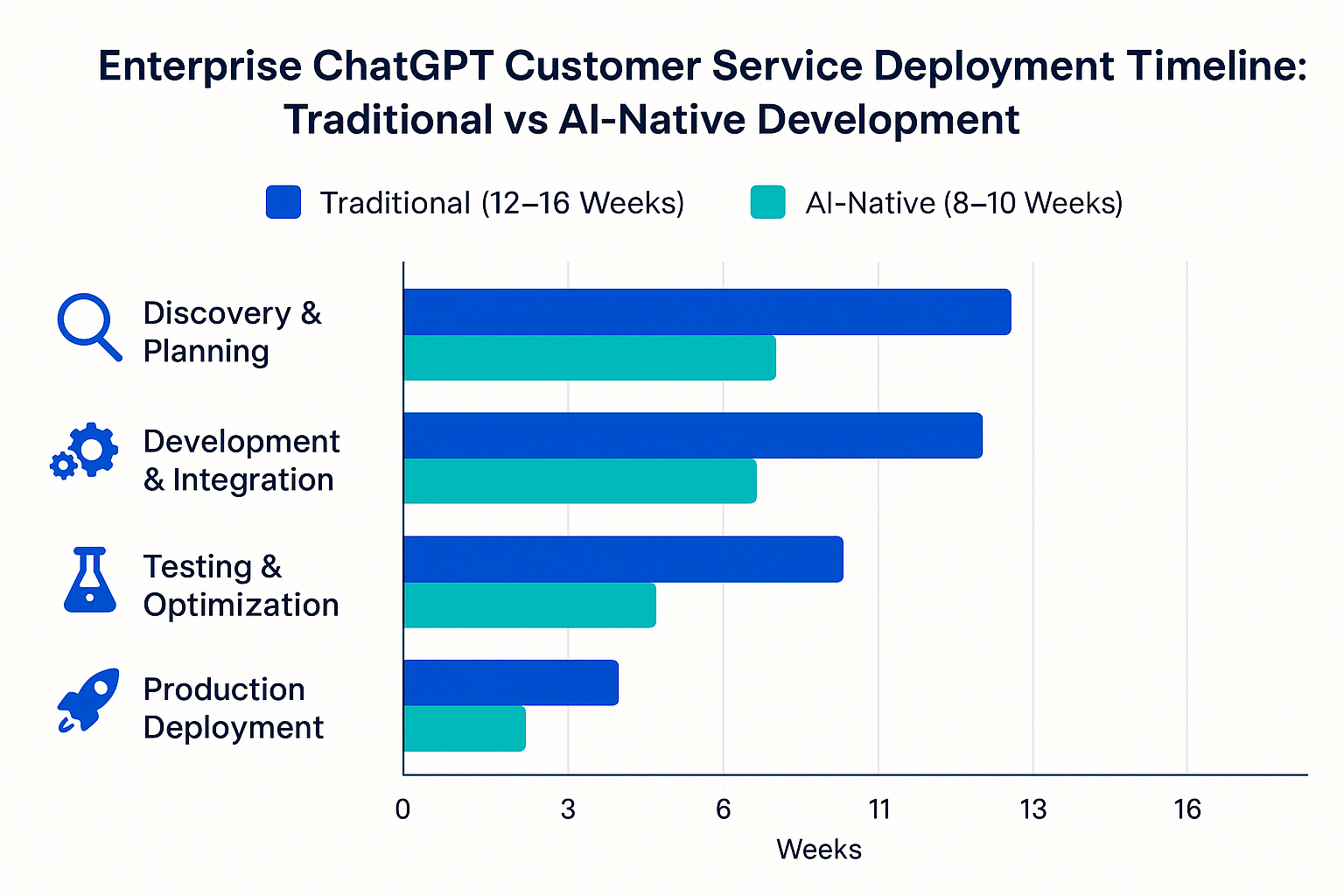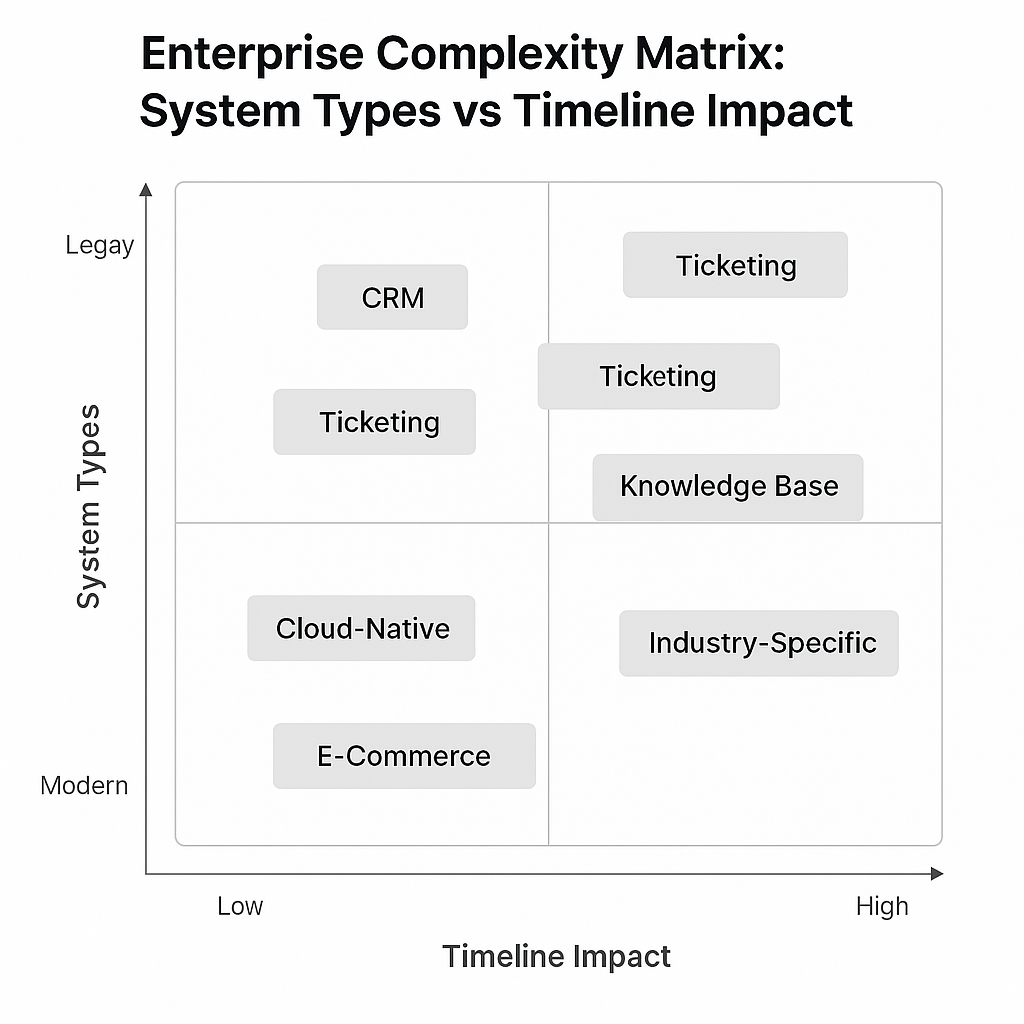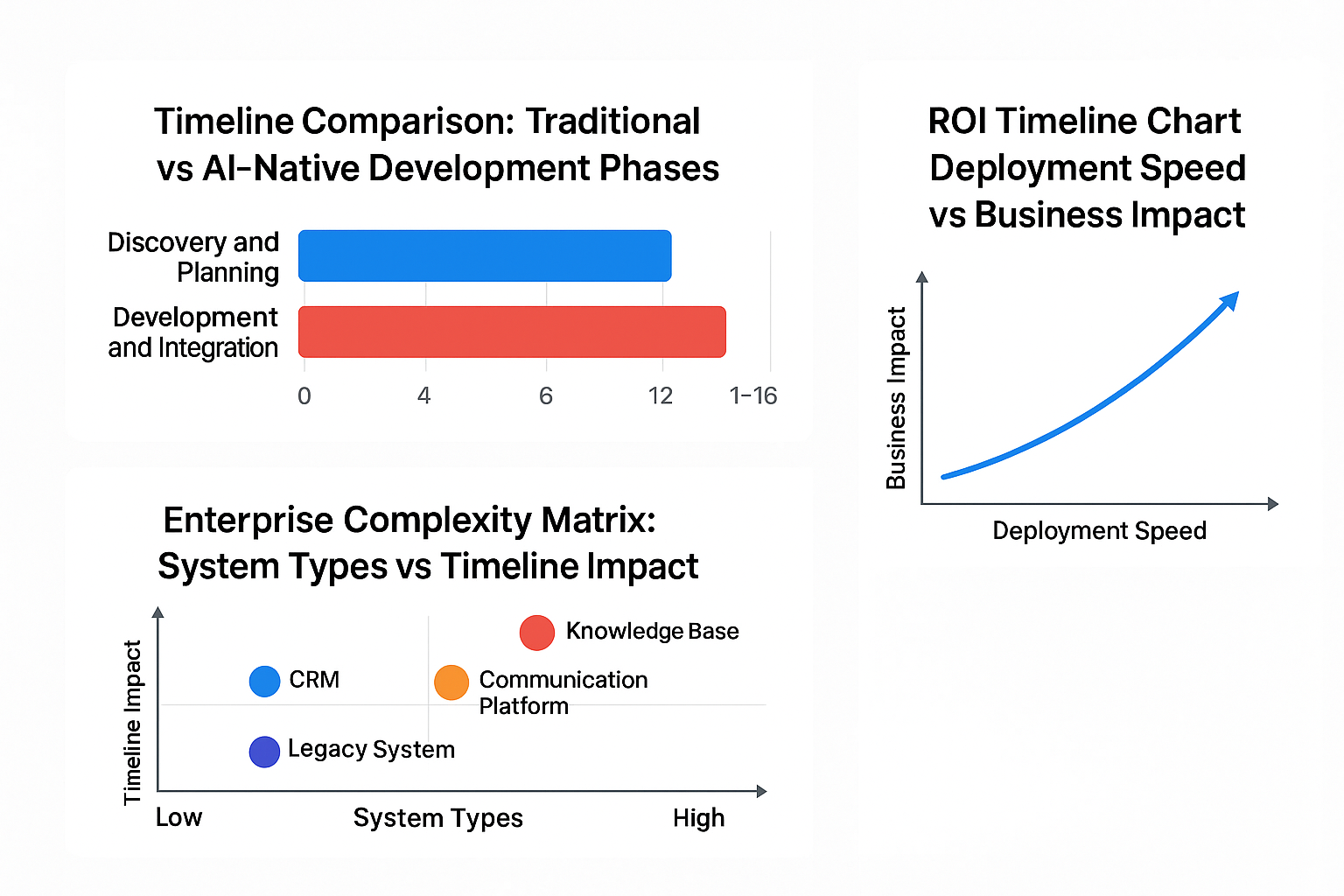How Long Does It Take to Launch a ChatGPT-Powered Customer Service Solution for Enterprise Clients?
Most enterprises think ChatGPT customer service deployments take forever—but AI-native development methodologies can significantly reduce project timelines, delivering solutions in weeks, not months. Traditional approaches drag projects out for 12-16 weeks while your competitors launch faster solutions and capture customer satisfaction gains.
Here’s the reality: enterprises that stick with waterfall development watch opportunities slip away. Meanwhile, organizations using AI-powered development methodologies demonstrate faster time-to-market with better quality outcomes. You’ll learn the exact timelines, phases, and acceleration strategies that certified AI development teams use to deliver enterprise customer service solutions faster than traditional methods.
Faster Deployment Means Competitive Advantage
Traditional timeline: 12-16 weeks using conventional development methods
- AI-native timeline: Significantly reduced deployment periods with proper planning
- Key factors: Team expertise, data preparation, and system complexity determine final timeline
- Best case scenario: Well-prepared organizations with AI-certified teams achieve deployment in 8-10 weeks
Standard Timeline: 12-16 Weeks for Traditional Enterprise Deployment
Enterprise ChatGPT customer service implementations require 12-16 weeks on average using traditional development approaches. This timeline aligns with industry-wide digital transformation project benchmarks that cover discovery, system integration, training, and deployment phases across complex enterprise infrastructure.
AI-native development approaches offer significant timeline compression through intelligent automation and accelerated integration processes. Companies using AI-powered development methodologies consistently report faster product launches compared to conventional waterfall approaches, with fewer post-launch issues.
The timeline difference stems from automated code generation, AI-powered testing, and pre-built enterprise connectors that eliminate routine development bottlenecks. Traditional software development involves more manual processes that inherently take longer than automated alternatives.
Timeline factors that affect deployment speed:
- Existing system complexity and API availability
- Data volume and quality requirements
- Compliance and security audit requirements
- Team experience with AI integration projects
Enterprise deployment speed depends heavily on these critical factors. Financial services and healthcare typically add 2-4 weeks for regulatory compliance and security audits, though organizations with established AI governance frameworks can streamline these processes.

Figure 1: Timeline Comparison Chart: Traditional vs AI-Native Development Phases
Week-by-Week Implementation Breakdown
Discovery and Planning (Weeks 1-2): Foundation Setting
The discovery and planning phase takes 1-2 weeks for most enterprise ChatGPT projects. This includes stakeholder interviews, system architecture review, and integration point identification across your customer service ecosystem.
AI consulting services can streamline discovery through automated system analysis and pre-built enterprise frameworks. Proper planning during this phase prevents 60% of common deployment delays that typically surface during integration and testing stages.
Key deliverables:
- System architecture assessment
- Integration point mapping
- Data quality evaluation
- Compliance requirement documentation
Development and Integration (Weeks 3-8): Core Implementation
Core development and integration spans 4-6 weeks for enterprise ChatGPT customer service solutions. This includes API development, system integrations, and custom workflow creation for enterprise requirements like multi-tenant architecture and advanced security protocols.
AI-powered development teams achieve significantly faster development cycles using tools like GitHub Copilot and intelligent code review systems. Automated testing reduces manual QA effort while maintaining enterprise security standards throughout the development cycle.
Development phases:
- Backend infrastructure setup (Week 3)
- ChatGPT integration and customization (Weeks 4-5)
- System integrations and API connections (Weeks 6-7)
- Security implementation and testing (Week 8)
Testing and Optimization (Weeks 9-11): Quality Assurance
Testing and optimization requires 2-3 weeks for comprehensive validation across all customer service scenarios. This includes load testing for expected user volumes, security validation, and user acceptance testing with real customer data sets.
AI-powered testing frameworks can identify issues faster than traditional testing approaches. Automated performance monitoring enables real-time optimization during the testing phase, catching issues before they impact production environments.
Production Deployment (Weeks 12-13): Go-Live
Production deployment typically takes 1-2 weeks for enterprise environments with proper change management processes. This includes staged rollouts, staff training, and performance monitoring setup across multiple customer service channels.
AI-Native Development: Speed Without Compromise
AI-native methodologies offer substantial timeline advantages through intelligent automation at every development stage. Teams using AI-powered tools complete coding tasks faster while maintaining code quality standards that meet enterprise requirements.
Key advantages of AI-native development:
- Automated code generation handles routine integration tasks
- Intelligent testing identifies potential issues during development
- Pre-built connectors accelerate legacy system integration
- Continuous validation ensures quality throughout development
Automated code generation allows developers to focus on complex enterprise requirements like custom business logic and advanced security implementations. This approach particularly benefits large-scale customer service implementations with multiple system touchpoints and legacy integrations.
Case study example: SmartDev’s AI-powered approach helped one Southeast Asian bank reduce their ChatGPT deployment timeline from 16 to 11 weeks through streamlined development processes and automated testing frameworks.
Enterprise solutions benefit from continuous integration pipelines that validate ChatGPT responses against business rules automatically. This ensures customer service quality meets enterprise standards before production launch, reducing the risk of reputation damage from poor AI responses.
Enterprise-Specific Timeline Factors
Legacy System Integration Adds 2-4 Weeks
Legacy system integration adds 2-4 weeks to standard ChatGPT deployment timelines for most enterprises. Organizations with modern API-first architectures can reduce integration complexity significantly through streamlined connectivity and pre-built connectors.
Customer service platforms requiring CRM integration, ticketing system connectivity, and knowledge base synchronization need additional development time. Proper system architecture planning during the discovery phase prevents integration bottlenecks that commonly surface during deployment phases.
Compliance Requirements Extend Timeline
Financial services and healthcare enterprises require additional 2-3 weeks for compliance validation and security audits. GDPR, HIPAA, and SOC 2 compliance add specific testing requirements to ChatGPT implementations that can’t be rushed without regulatory risk.
Enterprise security reviews include comprehensive validation of data handling, access control testing, and audit trail implementation. Organizations with established security frameworks can streamline this process through pre-approved AI governance policies and automated compliance checking.
Scale Requirements Impact Performance Testing
Enterprise ChatGPT solutions handling 10,000+ daily interactions require additional performance optimization time. Load testing and scaling configuration typically add 1-2 weeks to deployment timelines, but this investment prevents costly performance issues during peak usage periods.
Auto-scaling infrastructure and monitoring setup ensure customer service performance during peak usage periods. Proper capacity planning prevents post-launch performance issues that could delay full rollout across enterprise customer service operations.

Figure 2: Enterprise Complexity Matrix: System Types vs Timeline Impact
Ready to Launch Your Enterprise ChatGPT Solution Faster?
Partner with SmartDev’s AI-certified development teams to compress your deployment timeline from months to weeks, without compromising enterprise-grade security or compliance.
Book a free consultation to discover how our AI-native methodologies accelerate customer service transformation.
Accelerate My DeploymentBest Practices: Accelerate Your Deployment Timeline
Start With Comprehensive Data Preparation
Successful enterprise ChatGPT deployments begin with comprehensive data preparation and system documentation. Organizations with well-documented APIs and customer service processes reduce development time significantly through streamlined integration and reduced discovery overhead.
Data preparation checklist:
- Clean, structured customer service interaction data
- Documented API endpoints and system interfaces
- Standardized data formats across integrated systems
- Quality assessment of training data completeness
Training data curation and quality assessment should occur before development begins. Clean, structured customer service data enables faster model fine-tuning and reduces testing iterations that commonly extend project timelines.
Use Iterative Development Cycles
Iterative development cycles allow enterprises to validate ChatGPT functionality incrementally throughout the project. Two-week sprints enable continuous stakeholder feedback and requirement refinement, preventing scope creep that extends deployment timelines.
Agile methodologies particularly benefit complex enterprise environments where requirements may evolve during development. Regular stakeholder reviews ensure alignment between technical implementation and business objectives throughout the development process.
Choose AI-Certified Development Teams
Specialized AI development teams deliver enterprise solutions faster than traditional development teams. AI expertise reduces learning curves and implementation risks that commonly plague enterprise AI projects.
Enterprise projects benefit from teams with specific ChatGPT integration experience and industry knowledge. Domain expertise in customer service workflows accelerates development and reduces revision cycles that extend project timelines.
Risk Mitigation: Protect Your Timeline Investment
Address Data Quality Early
Data quality issues cause 40% of enterprise ChatGPT deployment delays beyond planned timelines. Incomplete customer service data requires additional preparation time that impacts overall schedules and can derail carefully planned rollout strategies.
Organizations that solve data governance challenges early deploy AI solutions faster and with higher success rates. Early attention to data quality and governance frameworks prevents common issues that surface during testing and deployment phases.
Plan for Integration Complexity
Integration complexity with legacy systems creates significant delay risks. Proper technical discovery prevents most integration-related timeline extensions through early identification of potential bottlenecks and compatibility issues.
Risk mitigation strategies:
- Include 20% timeline buffers for unexpected technical challenges
- Develop parallel tracks for different system components
- Create modular development approaches for deployment flexibility
- Establish clear escalation procedures for technical roadblocks
Build Contingency Planning
Enterprise projects should include 20% timeline buffers for unexpected technical challenges or requirement changes. Proper risk assessment during planning identifies potential delay factors early, allowing teams to develop contingency strategies.
Parallel development tracks for different system components can maintain overall timeline momentum if individual elements face delays. Modular development approaches provide deployment flexibility for enterprise environments with complex integration requirements.
ROI Impact: Why Timeline Optimization Matters
Competitive Advantage Through Speed
Faster ChatGPT deployment timelines provide immediate competitive advantages for enterprise customer service operations. Each week of earlier deployment can generate significant customer satisfaction improvements and operational cost savings through automated response capabilities.
AI-native development approaches may require higher initial investment but deliver faster time-to-market. The accelerated timeline often justifies premium development costs through earlier ROI realization and competitive positioning benefits.
Long-term Success Planning
Enterprise ChatGPT solutions require ongoing maintenance and optimization beyond initial deployment. Planning for continuous improvement ensures long-term success and prevents performance degradation that could impact customer satisfaction scores.
Organizations should allocate 15-20% of initial development resources for first-year maintenance and enhancement activities. Proper maintenance planning protects the initial deployment investment and enables feature expansion as business requirements evolve.
Each week gained on deployment can mean significant productivity and customer satisfaction gains that justify aggressive timeline optimization. Enterprise boards increasingly prioritize earliest possible AI launches to capture competitive advantages in customer service automation.

Figure 3: ROI Timeline Chart: Deployment Speed vs Business Impact
Ready to accelerate your enterprise ChatGPT deployment?
SmartDev’s AI-certified teams deliver customer service solutions using proven AI-native methodologies. Schedule your consultation to explore how we can compress your timeline while maintaining enterprise security and compliance standards.







